Lady Rehomes Her Brother’s Dog After He Bought It On A Whim And Neglected Taking Care Of Her
Finding a new home for your dog, where he or she will be secure and happy, is known as rehoming. Abandonment and rehoming are not the same thing.
You are doing what is best for your dog by finding him a good home. It's not the same as giving your dog to an animal shelter because you'll be taking him right from your house to a new one.
When you give your dog to a shelter, it will stay there until a new home is found. Unfortunately, many shelters are overcrowded, and some dogs never find their perfect family.
Before beginning the search for your dog's new home, it is beneficial to explore all alternative possibilities. It's never simple to have to give your pet up.
When circumstances beyond your control make it necessary, you may be compelled to give up your pet, or in this case, someone else’s pet. Yes, the Redditor in today’s post rehomed her brother’s dog because he didn’t take care of her.
Apparently, the OP’s brother bought the dog "on a whim and almost forgot about it afterward." The OP was the one caring for the dog until she couldn’t anymore since she works full time.
She told her brother to care for his dog, but it still fell on deaf ears, so she did what had to be done. Read the entire story for yourself below.
And here we go...

He bought the dog on a whim
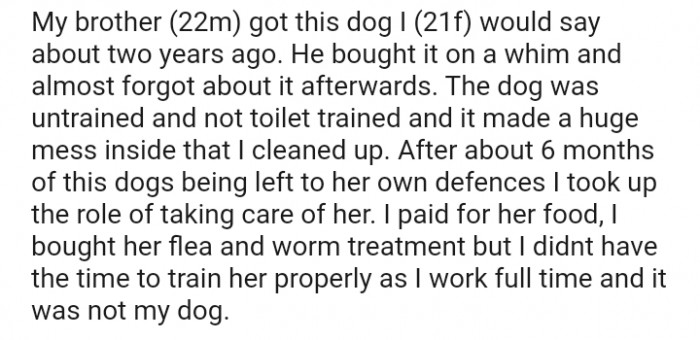
The dog ended up pregnant
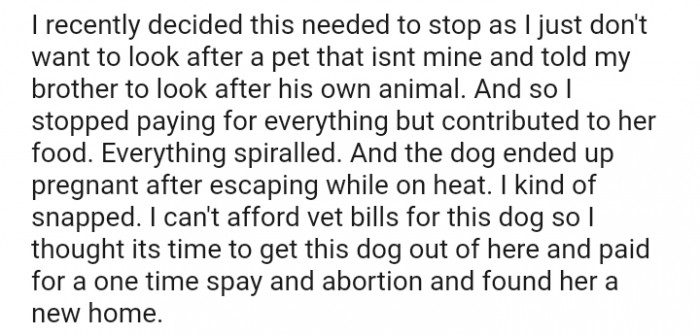
The Dynamics of Responsibility in Pet Ownership
From a psychological perspective, the decision to rehome a pet often reflects complex relational dynamics and personal accountability. Dr. Dan Gilbert, a happiness researcher, states, "The emotional burden of pet ownership can lead to feelings of inadequacy when individuals feel they cannot meet the demands of their pets." Dr. Dan Gilbert emphasizes that neglecting a pet can stem from a lack of support in fulfilling these responsibilities. Additionally, Dr. Michele Weiner-Davis, a marriage therapist, notes, "When individuals lack support in their caregiving roles, they may struggle to meet their pets' needs, resulting in difficult decisions about rehoming." Dr. Michele Weiner-Davis highlights the importance of having a strong support system for successful pet ownership.
Understanding Neglect and Responsibility
Research emphasizes the psychological burden associated with impulsive decisions, particularly in the context of pet ownership.
Dr. Julie K. N. Lutz from Stanford University highlights that neglecting an animal can stem from underlying issues such as avoidance or denial, particularly when faced with the responsibilities of care.
This behavior can create significant stress for both the animal and the caregiver, leading to ethical dilemmas about rehoming.
You should have looked after the dog
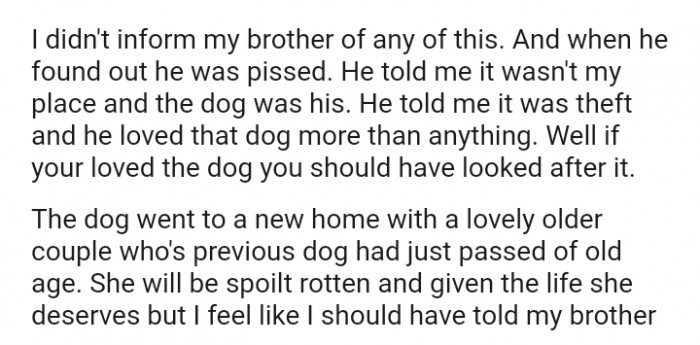
From the hundreds of comments that this Reddit thread received, we've gathered some of the most upvoted ones for you below. So go ahead and check them all out.
1. You should have told him first

2. They need care and love
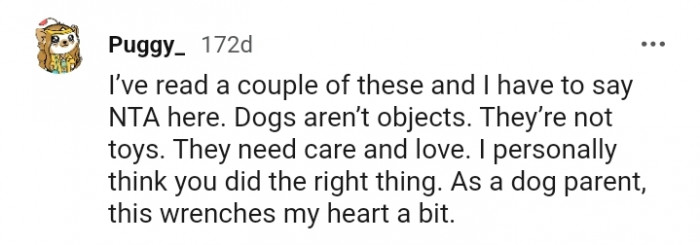
This situation also raises questions about impulse control and long-term planning. Psychology experts note that the decision to acquire a pet on a whim can often be linked to broader patterns of decision-making. Impulsivity, as identified in research on behavioral economics, can lead to short-term satisfaction but long-term regret when individuals fail to consider the full implications of their choices.
Additionally, studies show that individuals with lower levels of conscientiousness tend to struggle with responsibilities, which can manifest in neglecting pets. Recognizing these patterns can assist individuals in making more informed choices regarding pet ownership in the future.
Social psychologists explain that the decision to rehome a pet can often be rooted in perceived inadequacies or feelings of failure in fulfilling one's role as a pet owner.
According to studies published in the Journal of Abnormal Psychology, these feelings can trigger defensive reactions, making it difficult for individuals to accept their limitations.
Understanding these emotional responses is crucial for making responsible decisions regarding pet care.
3. Neglect is a terrible cruelty
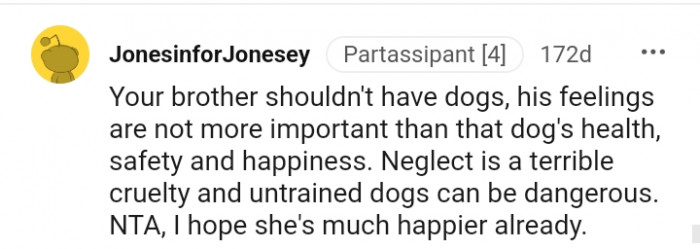
4. Let him loose the dog

5. A couple of days passed before he realized the dog was gone

Strategies for Responsible Pet Ownership
To address these issues, prospective pet owners should engage in thorough self-reflection and planning before adopting an animal. Research suggests that creating a decision-making framework can be beneficial. For instance, individuals should evaluate their lifestyle, financial capacity, and emotional readiness for the long-term commitment a pet requires.
Additionally, seeking support from existing pet owners can provide valuable insights into the realities of pet care. Joining community groups or attending pet care workshops can foster a sense of accountability and preparedness, ensuring that individuals are not only equipped to care for a pet but are also aware of the potential challenges involved.
Practical Solutions for Pet Ownership Challenges
For individuals struggling with the responsibilities of pet ownership, practical strategies can help alleviate the burden.
One recommendation is to create a comprehensive care plan before adopting a pet, including financial considerations and time commitments.
Additionally, seeking assistance from local animal welfare organizations can provide resources for training and behavioral support, reducing feelings of overwhelm.
6. The dog's welfare is more important

7. He's lucky you didn't report
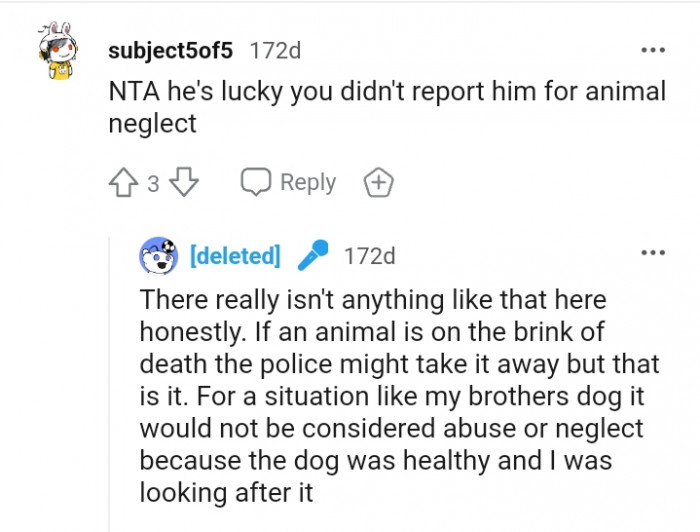
8. The OP revealed that this is a good idea

Moreover, education about the specific needs of different breeds and species is crucial. Dr. Daniel Goleman, an emotional intelligence expert, emphasizes that “understanding the emotional needs of pets can lead to a more fulfilling relationship for both the animal and the owner” on his professional website danielgoleman.info. Studies show that informed pet ownership significantly correlates with better animal welfare and owner satisfaction. By understanding the unique requirements of a pet, individuals can create an environment that fosters both their needs and their own emotional well-being.
This proactive approach to pet ownership encourages responsible decisions and fosters a healthier relationship between humans and their animal companions.
Building a support network with other pet owners can foster a sense of community and shared responsibility.
Joining local pet clubs or online forums can provide emotional support and practical advice, making the challenges of pet ownership feel less isolating.
Ultimately, addressing underlying emotional issues and fostering open communication can lead to healthier relationships with both pets and their owners.
9. Your brother wasn't taking care of the dog
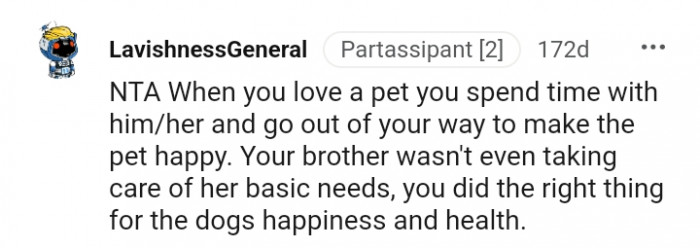
10. The dog knows you are right
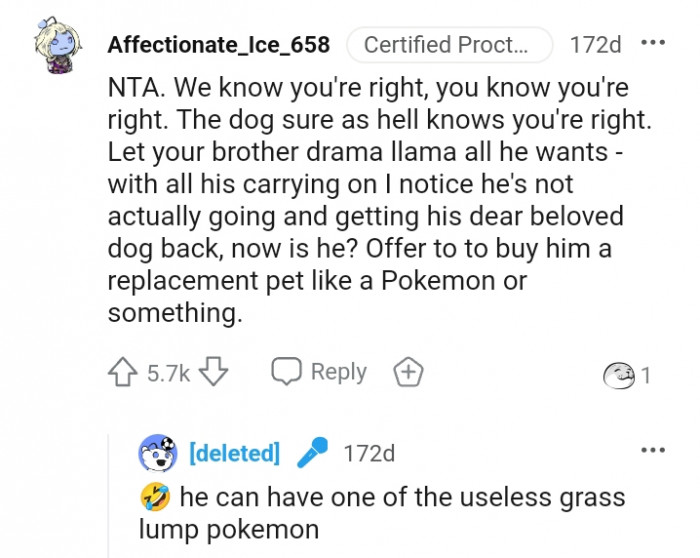
11. Dogs are living beings that have sentiments
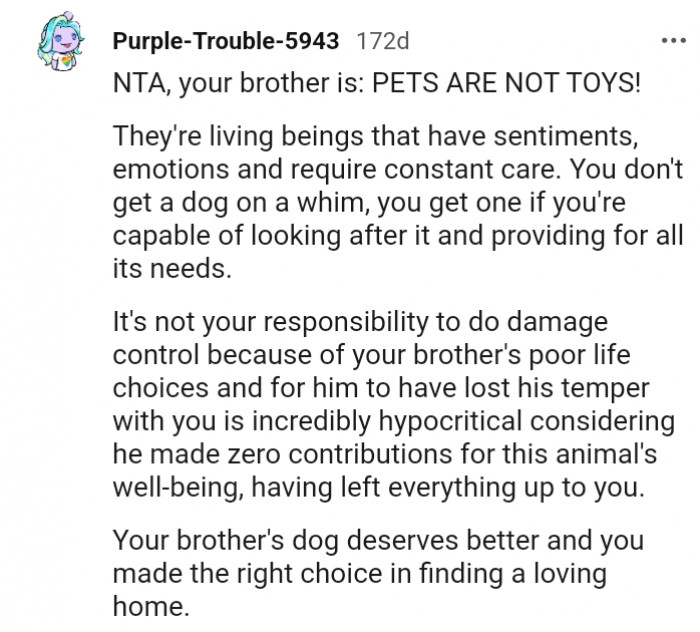
12. The OP was commended for really doing a lot to help
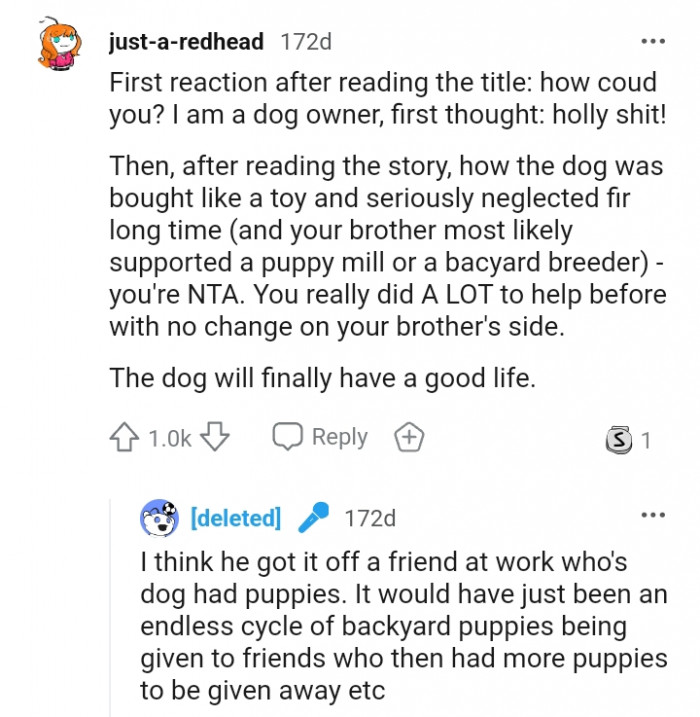
13. The dog now has a chance at a great life

14. Glad the dog is somewhere nicer
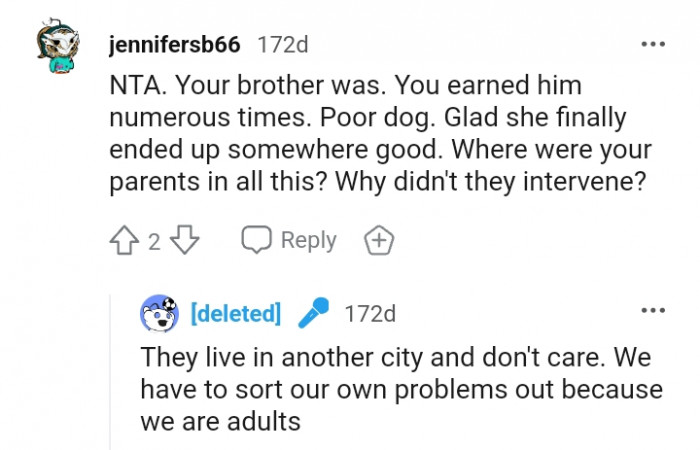
15. He loves the idea of having a dog
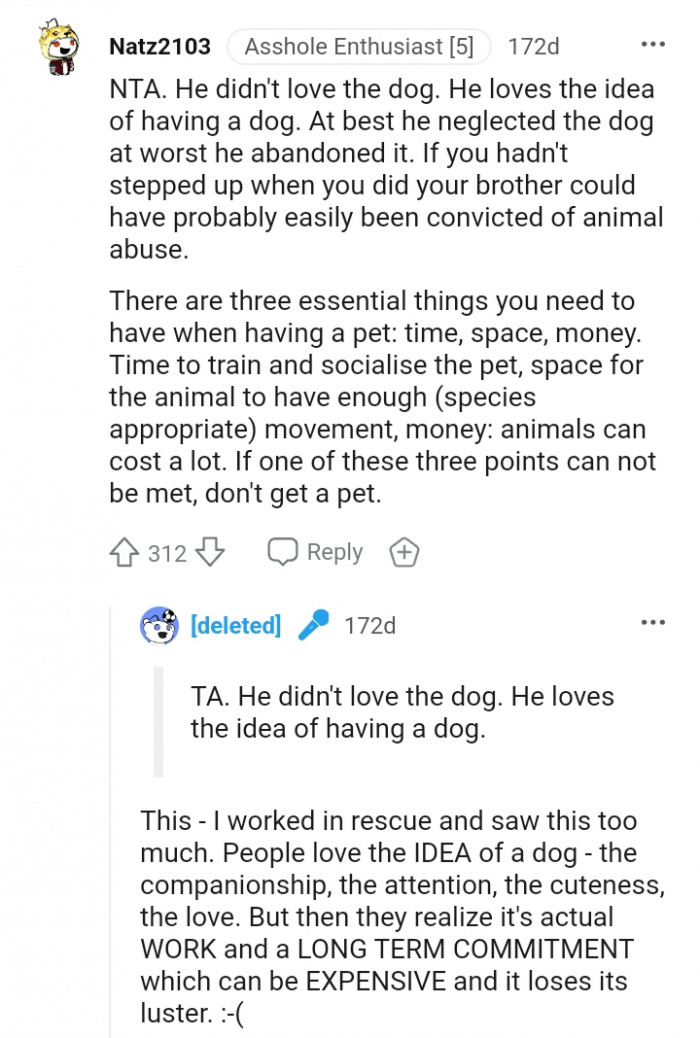
16. She's pretty much the owner of the dog
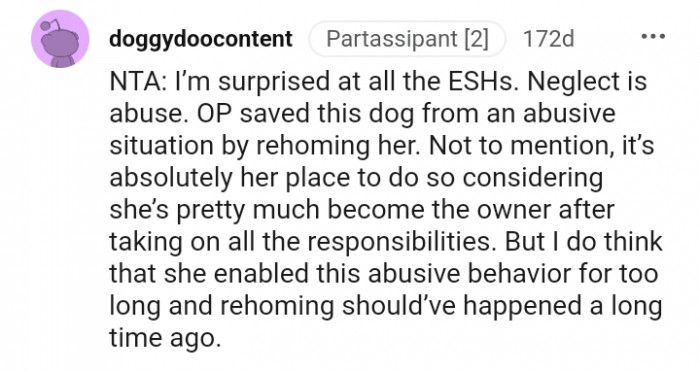
17. The dog was clearly being neglected

18. You saved this dog from a life of misery
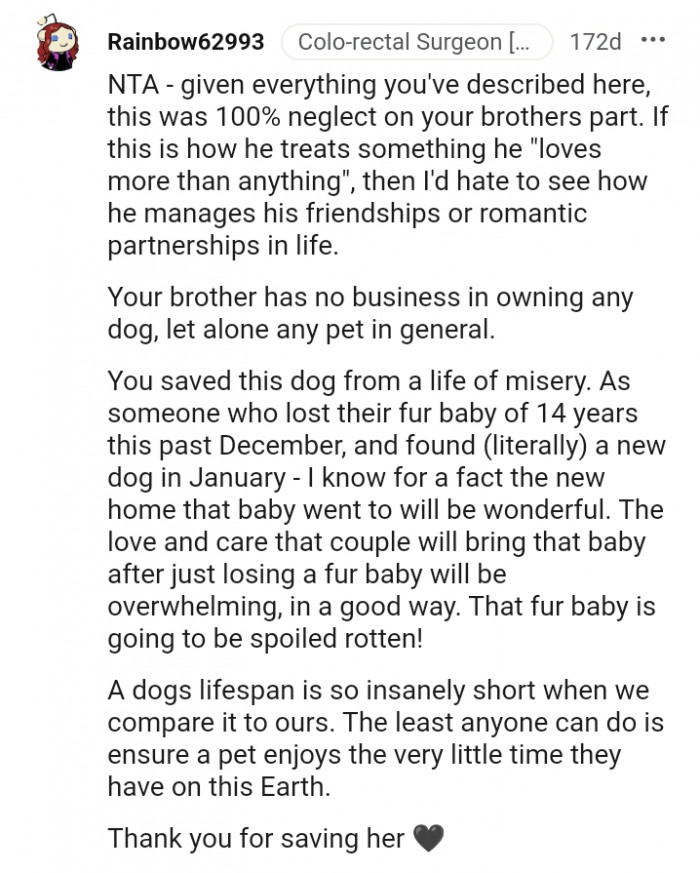
19. Thank you, OP

20. This Redditor thinks an apology would be appropriate
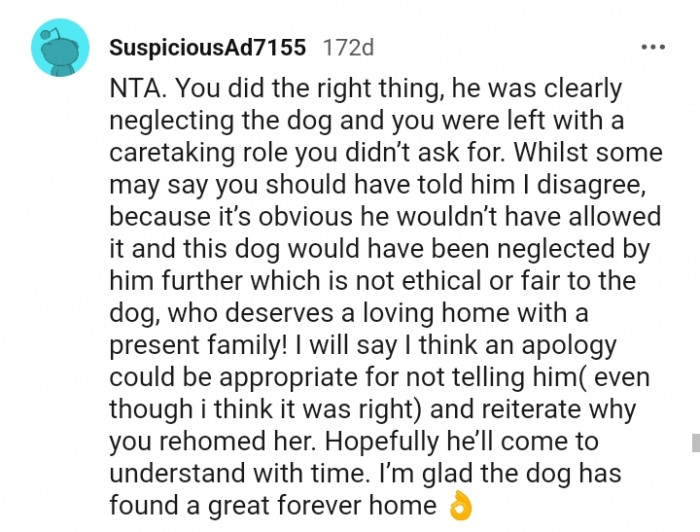
There are many reasons why one might want to rehome their pet. You may have discovered that the animal is the source of your allergies.
Or you might not be able to take care of your pet anymore due to financial difficulties. Whatever the cause, it is still difficult to part with a devoted friend, but this is clearly a different case, and the dog deserves better.
Psychological Analysis
This situation illustrates the significant emotional turmoil often associated with neglecting a pet's needs, which can stem from underlying feelings of inadequacy.
Recognizing these emotions is essential for moving forward and making responsible decisions about pet care and rehoming.
Analysis generated by AI
Analysis & Alternative Approaches
Addressing the complexities of pet ownership requires a nuanced understanding of emotional dynamics and responsibilities.
Research indicates that open communication and proactive planning are vital in ensuring the well-being of both the pet and the owner.
Ultimately, fostering a supportive community can also play a crucial role in navigating these challenges successfully.
Analysis & Alternative Approaches
This case underscores the importance of understanding the responsibilities tied to pet ownership. Mental health professionals agree that impulsive decisions often lead to regret and highlight the need for comprehensive planning and education.
Ultimately, fostering a sense of responsibility and community support can enhance the pet ownership experience, promoting healthier relationships between pets and their owners.



